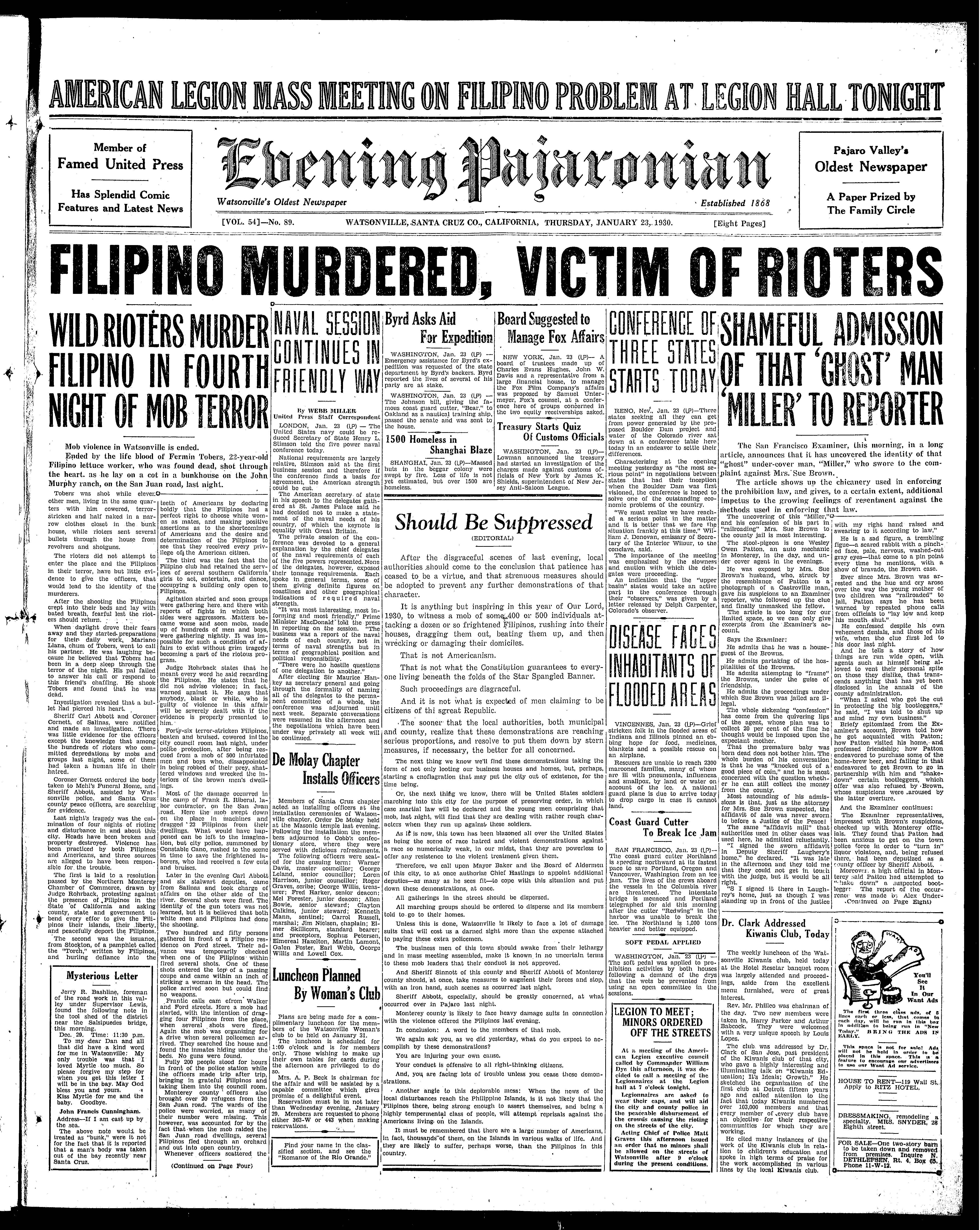
Apolonia was born in northwestern Manila in the Philippines. She married at 27 and moved with her husband to Hawaii, and then, Marysville, California where she would divorce him in 1926 and sever from him entirely. A resilient single woman, she managed several businesses throughout her life: a pool hall, boarding and rooming homes, labor contracting and supervising, a nightclub, and liquor stores. Most of her businesses were in Watsonville, where she joined a large Filipino community upon arriving in 1927. Apolonia was a tough lady. She was direct and firm in all her business dealings cultivating respect in male dominated spheres. From her cultural perspective being a female business owner was not remarkable, though it was less common at the time in the United States. She recalls her work as a labor contractor and boarding house operator for “the boys” Filipino men who worked in Watsonville.
Audio Interview
Regional History Project
(1977/2004)
On Coming to Watsonville: “I heard Watsonville and Salinas is good, because you got a lot of people in there, and good business. Many people told me. The people come down here to work the fruit, because they had a lot of fruit here—apples, pears, peaches, grapes. ‘Why don’t you come to Watsonville, Mama, or Salinas, because there is good business down there.’ So I made my mind up to come here.”
On Being Her Own Boss: “I stopped working under anybody. I farmed for myself. My company quit the business and I stopped doing the work. I don’t go any place no more. I farmed for myself. Bought a tractor and everything, recruited men for the field. I buy all the equipment needed for the farming. Later I grew strawberries. I just took the share to the company, to Driscoll. I worked the land for half the profit. I did that for four years. Only one strawberry season, because strawberries are a three-year season. You plant strawberries every three years. But I quit. I was tired. I had a lot of business in town to take care of and my girl grew up. I got my son, my other adopted son. I put him in the back of the station wagon when I went to the fields. But I don’t like very much to come to the field early in the morning and come home at five o’clock.”
© Regents of the University of California. Courtesy Special Collections, University Library, University of California Santa Cruz. Audio detail from the Regional History Project Collection, Apolonia Dangzalan: Filipina Businesswoman, Watsonville, California. Retrieved from https://escholarship.org/uc/item/1ws3277f.

Photo from Microfilm
Watsonville Evening Parajonian,
September 23, 1930
Watsonville Public Library
In September of 1930 a mostly white mob incited violent riots against Filipinos in Watsonville. There were numerous reports of attacks. A group of Filipno men in their living quarters were surrounded and fired upon, killing Fermin Tobers, a twenty-two year old lettuce picker. Many factors contributed to this irruption of violence including, primarily, a rejection of interracial coupling and anti-immigrant policies seeking to deport Filipinos, who were by legally allowed to work and live here. Apolonia ran her businesses with her nephew Frank Barba. Sometime before the riots took place, Apolonia, Frank, and “the boys” she contracted to work in the fields left Watsonville to temporarily find work in Arizona. When they returned the riots ended.
The University of California’s Regional History Project documents the stories of Santa Cruzans since 1963. They continue with that work today. These stories not only document unique lives, but also tell a larger story about the life of agricultural and lumber laborers, business women, students, LGBTQIIA, and communities of color in Santa Cruz County. Listen to Santa Cruzans share their experiences in their own words. If you navigate to the MAH Do You Know My Name? virtual exhibit, you can further explore links to their stories and listen to the full interviews through the Regional History Project.
© Regents of the University of California. Courtesy Special Collections, University Library, University of California Santa Cruz. Regional History Project Collection. Retrieved from https://library.ucsc.edu/regional-history-project.